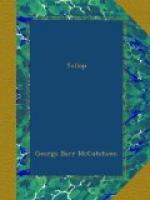The foreman, or Juror No. 1, was an insurance agent. He was a man of fifty and he knew how to talk. His voice was loud, firm, overriding and unconquerable; his manner suave, tolerant, persuasive. The bailiff, after obtaining each man’s telephone number and the message he wished to have sent to his home (if any), informed the jurors that he would be waiting just outside if they wanted him and then departed, locking the door behind him; whereupon the foreman looked at his watch and announced that it was twenty minutes to four. This statement resulted in the first disagreement. No two watches were alike. Some little time was consumed in proving that all twelve of them were right and at the same time wrong, paradoxical as it may sound. After the question of the hour had been disposed of, the foreman suggested that an informal ballot be taken for the purpose of ascertaining the views of the gentlemen as to the guilt or the innocence of the defendant. The result of this so-called informal ballot was nine for conviction, three for acquittal.
“Now we know where we stand,” explained the foreman. “In view of the fact that nine of us are for conviction and only three for acquittal it seems to me that it is up to the minority to give their reasons for not agreeing with the majority. I see by your ballot, Mr.—er —Mr. Sandusky, that you are in favor of acquitting—”
“My name is I. M. Pushkin,” interrupted Juror No. 7. “I wrote it plain enough, didn’t I?”
“The initials confused me,” explained the foreman. “Well, let’s hear why you think he ought to be acquitted.”
“I know what it is to be hungry, that’s why. I see the time when I first come to this country when I didn’t have nothing to eat for two-three days at a time, and ever’body tellin’ me to go to hell out of here when I ask for a job or when I tell ’em I ain’t had nothing to eat since yesterday morning and won’t they please to help a poor feller what ain’t had nothing to eat since yesterday morning, and—”
Six or seven voices interrupted him. It was Juror No. 4, salesman, who finally succeeded in getting a detached question to him.
“As I was saying, where do you get any evidence that he was hungry?”
“I guess you wasn’t paying much attention to the evidence,” retorted Mr. Pushkin. “Didn’t you hear that lawyer say, over and over yet, how he was almost starved to death? Didn’t—Wait a minute!—didn’t you hear him say to that deaf witness that the prisoner fell down like a log when he push him in the face? Just push him,—nothing else. Didn’t you hear that?”
“Sure I heard it. We all heard it. But what evidence is there?”
“Evidence? My gracious, ain’t that enough? Ain’t one man’s word as good as another’s? And say, let me ask you this: Is there any evidence that he wasn’t almost starved to death! Well! Humph! I guess not. There ain’t a single witness that says he wasn’t hungry— not one, I tell you. You can’t—”




